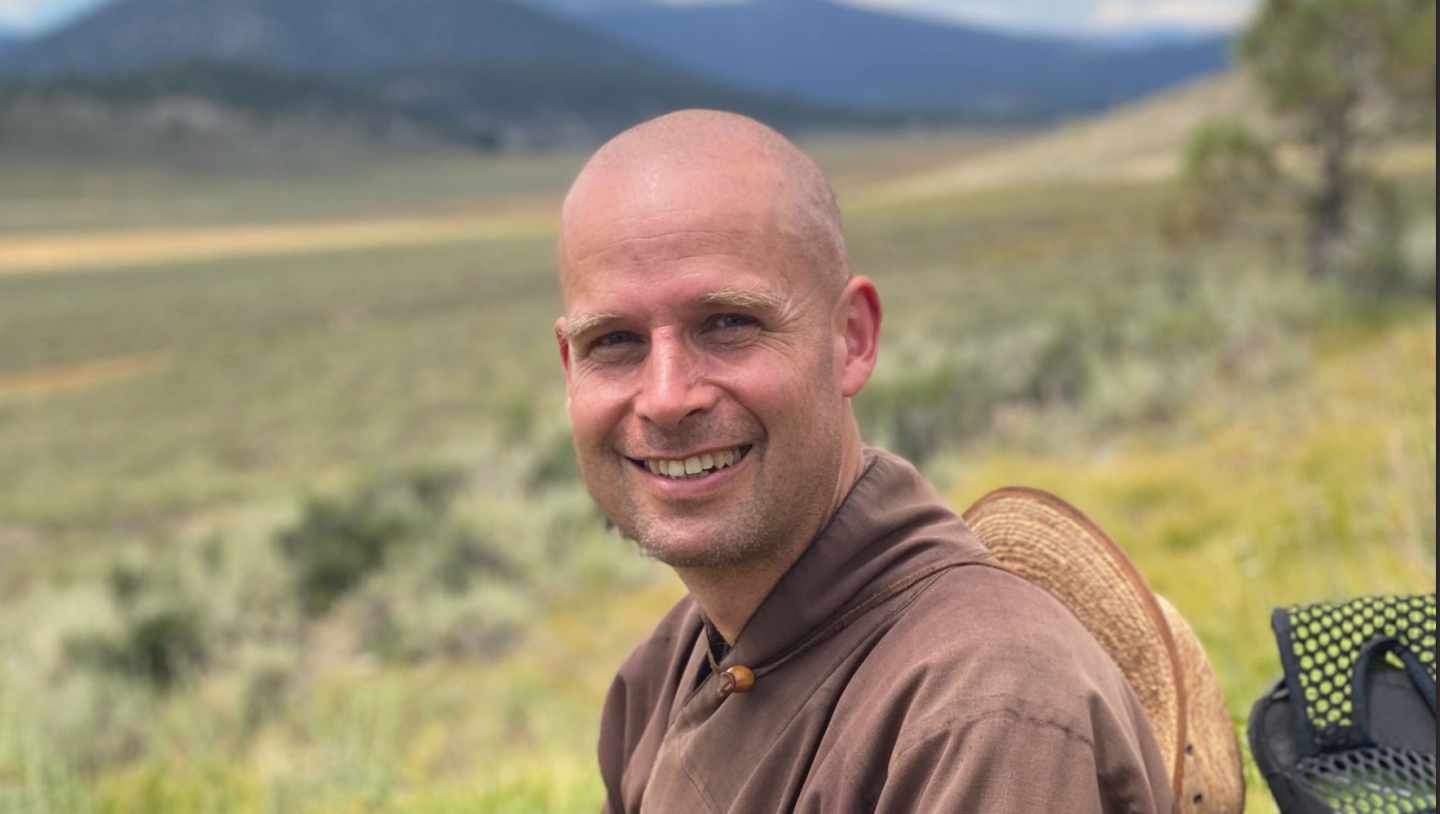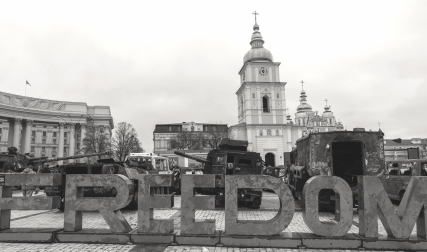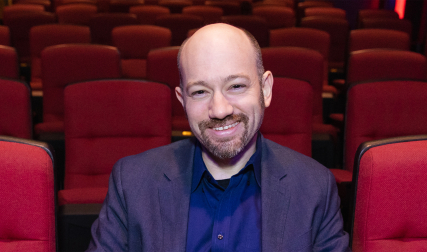In April 2023, 10 monastics from Deer Park Monastery in Escondido, California, spent a week leading mindfulness and meditation sessions with students on campus at Dartmouth. The visit was a side trip on their way to attend the formal opening of the Thich Nhat Hanh Center for Mindfulness in Public Health at Harvard—the first such academic center of its kind, named for the internationally recognized Vietnamese Buddhist monk, a peace activist and driving force behind the introduction of mindfulness to the Western world. It was also a homecoming of sorts for one of the Deer Park monks, Brother Pháp Lưu, known previously as Doug Bachman.
Bachman had enrolled at Dartmouth after an “idyllic” childhood in Connecticut that was not without emotional difficulty. His parents were separating, on their way to divorcing. “It felt like the bottom dropped out in my life,” he recalls. Bachman busied himself in his coursework and a rich extracurricular life. He ran cross country, played bass in a funk band called Mongoose Root, and joined Sigma Phi Epsilon and Fire & Skoal. He was disciplined and focused. “When he was first reading James Joyce,” one friend recalls, “that’s all he wanted to talk about.” He took long solitary walks along the Connecticut River. Only his closest friends sensed his depression.
He felt his mind crack open in education classes taught by Andrew Garrod and Randy-Michael Testa, and in the writings of Plato, Karl Marx, and Wendell Berry. The more he learned about class and violence and labor history, the more alienated he felt from the privileged world in which he’d grown up and saw his classmates striving for.
Following graduation, Bachman spent three years on a self-described “independent foreign-study program,” bouncing around Ireland, Spain, and France, searching for community and meaning. He became involved with student protests centered on economic justice. He lived with 30 or 40 young activists in a squat in Paris’ 20th Arrondissement, finding his food on the street. He lived and worked in what he calls a “quasi-commune/organic farm” in northern Spain. He grappled with the petty divisions and internal squabbles that bubbled up and, increasingly, with the violence sparked by their protests. He returned home to Connecticut depressed, looking for clarity and moral purpose.
Bachman was ordained as a Buddhist monk and received his monastic name Brother Pháp Lưu (“Brother Stream”) in 2003.
In 2000, he found his way back to Dartmouth, still seeking. He knew professors who would let him audit classes for free. He took courses in anthropology, religion, and Native American literature. He read Gandhi’s letters and scoured Baker Library’s stacks for everything he could find on Buddhism. While working one day at Left Bank Books—the second-floor, secondhand bookshop on Main Street—Bachman watched a small group of monks from the Maple Forest Monastery in nearby Woodstock, Vermont, as they browsed. “I was just like, wow,” he recalls. “They embodied this absolute calm, this quiet energy of mindfulness. I had met a spiritual teacher in Madrid, but I always wondered, How do you get that energy? How do you train yourself? I saw these monks and knew they were students of a special teacher who somehow transmitted this energy. So I went to find their teacher.”
The teacher was Thich Nhat Hanh, the exiled monk who spread his teachings through the Plum Village Monastery in southern France and its sister monasteries around the globe. Bachman began attending retreats at Maple Forest, then met Nhat Hanh a year later at a dharma (“right way,” “path of rightness”) talk in Providence, Rhode Island. “I was almost on my knees the whole talk,” he says. “I mean, I don’t want to sound evangelical to people, but it felt like I was meeting Jesus.”
Bachman followed Nhat Hanh to Plum Village and developed a close relationship with the Zen master. Bachman was ordained as a Buddhist monk and received his monastic name Brother Pháp Lưu (“Brother Stream”) in 2003. In 2011, he received Transmission of the Lamp directly from Nhat Hanh, becoming a dharma teacher in the centuries-long
Buddhist lineage of Zen masters and disciples.
In addition to serving as monastic editor on several books written by his master, Pháp Lưu helped develop Plum Village’s community organic garden, its Wake Up initiative (a mindfulness movement aimed at young people), and Wake Up Schools, which works to add mindfulness training to school curriculums. More important, he had discovered his sangha, a community of like-minded people living intentional, peaceful, self-aware lives and following the teachings of the Buddha.
In the spring of 2006, the community asked Pháp Lưu to move from Plum Village to Deer Park, a newer monastery in dire need of energy. The largest of the three, Plum Village practice centers in the United States, Deer Park had been operating for less than a decade. The location had been handpicked by a scouting party for Nhat Hanh. Thirty miles north of San Diego, the 400 hillside acres of chaparral shrubland included a mountaintop view and wooded glens of lilac and oak. Its small cluster of buildings had served, as Buddhist magazine Lion’s Roar explained in 2011, “as a detox center, a nudist resort, housing for prisoners, and a marksmanship training center for police officers. When the sangha bought the complex, the buildings were dilapidated and full of bullets and trash.”
The monastery has since built a hacienda-style nunnery and a large, handsome meditation hall with a curving copper roof, but much of the scrappy, 1950s-era infrastructure remains, including a cracked in-ground swimming pool and a buckling access road, giving the practice center a decidedly non-intimidating, non-religious aura.
Though he has a shaved head and wears simple brown robes, Pháp Lưu fills only parts of his days in solitude and meditation. Along with about three dozen other American and Vietnamese brothers and sisters, he helps organize a regular calendar of retreats and “days of mindfulness.” Twenty years ago, 30 or 40 people might show up on a Sunday, when the public is invited to sit, listen to a dharma talk, and walk and share a meal with the monastics in silent meditation. These days, it can be as many as 400 people, with advance online registration required.
He travels frequently. He has recorded a series of dharma talks on YouTube and contributes to Deer Park’s weekly Dharmacast podcast. He leads mindful backpacking retreats in Deer Park, the Sierra Nevada, and Joshua Tree National Park, and on the Appalachian Trail.
Even as his spiritual practice has deepened his painful awareness of the world’s sufferings, Pháp Lưu has found contentment in the community he had set out to find as a young seeker. He also has found deep purpose—perhaps even pride, though he’d be reluctant to say so—in the role he plays as part of a lineage that stretches back 2,600 years. “Buddhism has spread from India to Vietnam, and now from Vietnam to the West,” he says. “We are living through that transmission. I am trying to help in a small way.”
Jim Collins is a former editor of DAM. He wrote about environmentalist Dan Reicher ’78 in the May/June 2023 issue.




